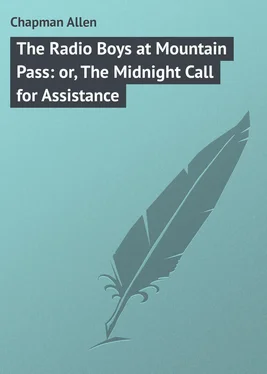Allen Chapman - The Radio Boys at Mountain Pass - or, The Midnight Call for Assistance
Здесь есть возможность читать онлайн «Allen Chapman - The Radio Boys at Mountain Pass - or, The Midnight Call for Assistance» — ознакомительный отрывок электронной книги совершенно бесплатно, а после прочтения отрывка купить полную версию. В некоторых случаях можно слушать аудио, скачать через торрент в формате fb2 и присутствует краткое содержание. Жанр: foreign_prose, foreign_children, на английском языке. Описание произведения, (предисловие) а так же отзывы посетителей доступны на портале библиотеки ЛибКат.
- Название:The Radio Boys at Mountain Pass: or, The Midnight Call for Assistance
- Автор:
- Жанр:
- Год:неизвестен
- ISBN:нет данных
- Рейтинг книги:4 / 5. Голосов: 1
-
Избранное:Добавить в избранное
- Отзывы:
-
Ваша оценка:
- 80
- 1
- 2
- 3
- 4
- 5
The Radio Boys at Mountain Pass: or, The Midnight Call for Assistance: краткое содержание, описание и аннотация
Предлагаем к чтению аннотацию, описание, краткое содержание или предисловие (зависит от того, что написал сам автор книги «The Radio Boys at Mountain Pass: or, The Midnight Call for Assistance»). Если вы не нашли необходимую информацию о книге — напишите в комментариях, мы постараемся отыскать её.
The Radio Boys at Mountain Pass: or, The Midnight Call for Assistance — читать онлайн ознакомительный отрывок
Ниже представлен текст книги, разбитый по страницам. Система сохранения места последней прочитанной страницы, позволяет с удобством читать онлайн бесплатно книгу «The Radio Boys at Mountain Pass: or, The Midnight Call for Assistance», без необходимости каждый раз заново искать на чём Вы остановились. Поставьте закладку, и сможете в любой момент перейти на страницу, на которой закончили чтение.
Интервал:
Закладка:
“That’s bearly possible,” chuckled Herb, and grinned at the indignation of his companions at the pun.
“But I think there’ll be something doing at church tomorrow on the subject of radio,” continued Bob. “You fellows must be sure to be there. I heard Doctor Dale talking about it to father.”
“I’ll be there if I can wake up in time,” said Jimmy. “But just now I feel as if I could sleep through the next twenty-four hours straight. I’ll be like one of the seven sleepers of Pegasus.”
“Ephesus, I guess you mean,” laughed Bob. “Pegasus was a horse.”
“Is that so?” replied Jimmy. “Well, that’s a horse on me. Don’t hit me,” he begged, as Bob made a pass at him. “I’m stiff and sore all over, without having that big ham of yours land on me.”
Bob laughed and went up the steps, while the others made their ways to their respective homes not many doors away.
As they had anticipated, the telling of the adventures that they had gone through that day was listened to with breathless interest by all the members of their families. At places in the story there was laughter, but more frequently there were exclamations of alarm mingled with great relief that they had come through safely.
“I tell you,” said Bob, as he finished telling of the matter to his parents. “I felt mighty cheap to think that I had run like mad from a bear that, as the Italian said, was simply trying to ‘maka frens’ with me.”
“It was rather amusing after it was all over,” assented his father, with a smile. “But after all you were very wise to act as you did. It isn’t by any means certain that the bear would have been as friendly with you as he was with his master, and resistance of any kind might have awakened all his savage instincts. I am very doubtful about the bear thinking it was only a game when he was climbing up after you. But even if he did, you had no reason to suppose it. For all you knew he might have escaped from a circus or menagerie and might have been ready to tear you in pieces.”
“That was my first thought; that is, as soon as I could think calmly about anything,” answered Bob. “But, after all, a miss is as good as a mile, and he didn’t get us. He came mighty near it though.”
“The most serious outcome of the whole thing will probably be the matter of the broken roof,” said Mr. Layton meditatively. “It will probably cost considerable to put it in perfect shape again. But, after all, that doesn’t count for anything as long as you boys weren’t hurt. I’ll see Looker about it on Monday and fix the matter up with him.”
“And of course the fathers of the other fellows will chip in on the expense,” said Bob. “I’d like to hear what Buck is telling his father about it tonight,” he continued, with a grin. “By the time he gets through, we’ll have pulled the whole house down.”
The next morning all the boys were at church in time for the morning service, even Jimmy, who walked very stiffly and smelled strongly of arnica.
“You fellows needn’t sniff as though I had the plague,” he protested, as his friends lifted their nostrils inquiringly. “I was the fellow who was underneath when you fell on me like a thousand of brick. You got off easy, while I had all the worst of it. But then I’m used to that,” he concluded, sighing heavily.
“Cheer up, old boy,” said Joe, clapping him on the back, at which poor Jimmy winced. “The first hundred years is the worst. After that you won’t mind it. But now we’d better get in if we want to sit together, for there’s a bigger congregation here than usual.”
Doctor Dale, the friend and counselor of the boys in radio, as in many other things, was in the pulpit. He was a very eloquent preacher and was always sure of a good congregation. But as Joe had said, the church was even fuller than usual that morning, and there was a general stir of expectancy, as though something unusual was in prospect.
The attention of the boys was attracted at once by a small disk-like contrivance right in front of the preacher’s desk. It had never been there before. They recognized it at once as a microphone, but to the majority of the audience its purpose was a complete mystery, and many curious glances were fixed upon it.
There were the customary preliminary services, and then Doctor Dale came forward to the desk.
“Before beginning my sermon this morning,” he said, “I want to explain what will seem to some an unusual departure from custom, but which I hope will justify itself to such an extent as to become a regular feature of our service.
“There is no reason why the benefits of that service should be confined to the persons gathered within these four walls. There are thousands outside who by the means of radio, that most wonderful invention of the present century, can hear every word of this service just as readily as you who are seated in the pews. The prayers, the hymns, the organ music, the sermon, the benediction – they can hear it all. The only thing they will miss will be the privilege of putting their money in the collection plate.”
He paused for a moment, and a smile rippled over the congregation.
“I have said,” he resumed, “that they can hear it. And if they can hear it, they ought to hear it – that is if they want to. This is no new or untried idea. It is being carried out today in Pittsburgh, Washington, and other cities. The pulpit becomes a religious broadcasting station, from which the service is carried over an area of hundreds of miles. Everybody within that area who has a receiving set can hear it if they wish. In some cases it is estimated that more than two hundred thousand people are enjoying at the same moment the same religious service. You can see at once what that means in immeasurably extending the usefulness and influence of the church.
“Now it has occurred to me that we might do here what is being done elsewhere on a larger scale. So, after a conference with the officials of the church, an adequate sending set has been installed in the loft of the building. What is said here is sent from this microphone to the loft, where it is flung out into the ether. Arrangements have been made with a number of churches in this county, too poor and small to have a regular pastor, by which they have installed loud speaker receiving sets in their buildings. At this moment there are a dozen scattered congregations where the people have gathered to worship, and where at this moment they are hearing everything that is said just as plainly as you do.
“And in addition to that,” he went on, “in hundreds, perhaps thousands of homes, people who cannot go to church because of illness or some other reason are listening to this service. The sick, the crippled, the blind – think of what it means to have the church brought to them when they cannot go to the church. You in the pews are the visible congregation. But outside these walls there is today an invisible congregation many times greater, to whom this service is bringing its message of help and healing.”
With this prelude, Doctor Dale announced his text and preached his sermon, which, if anything, was more eloquent than usual. It seemed as if he were inspired by preaching to the greatest audience that he had ever had in his whole career, and the audience in the pews also felt a thrill as they thought of the invisible listeners miles and miles away. It seemed as though the natural were being brought into close connection with the supernatural, and the impression produced was most powerful.
If the doctor had had any misgivings as to the attitude of his people toward this new departure, these were quickly dissipated by the cordial congratulations and approval that were expressed after the service was over and he moved about among them. It was the universal opinion that a great advance had been made and that the innovation had come to stay.
Читать дальшеИнтервал:
Закладка:
Похожие книги на «The Radio Boys at Mountain Pass: or, The Midnight Call for Assistance»
Представляем Вашему вниманию похожие книги на «The Radio Boys at Mountain Pass: or, The Midnight Call for Assistance» списком для выбора. Мы отобрали схожую по названию и смыслу литературу в надежде предоставить читателям больше вариантов отыскать новые, интересные, ещё непрочитанные произведения.
Обсуждение, отзывы о книге «The Radio Boys at Mountain Pass: or, The Midnight Call for Assistance» и просто собственные мнения читателей. Оставьте ваши комментарии, напишите, что Вы думаете о произведении, его смысле или главных героях. Укажите что конкретно понравилось, а что нет, и почему Вы так считаете.












